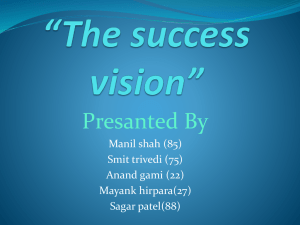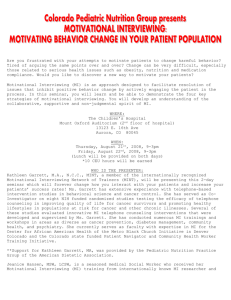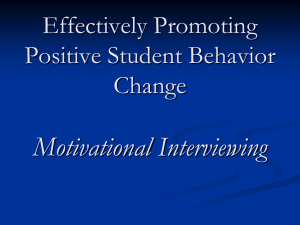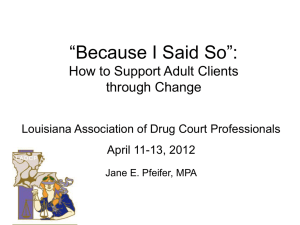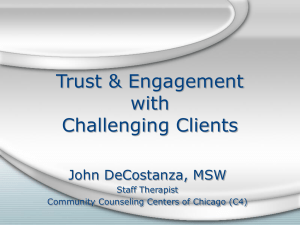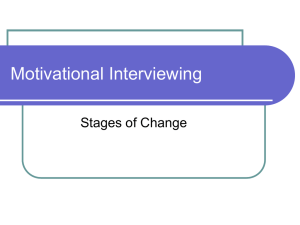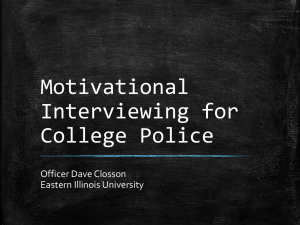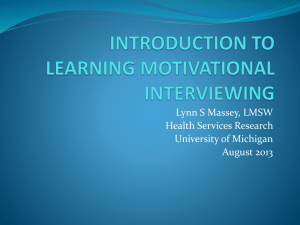Motivational Interviewing Implementation and
advertisement
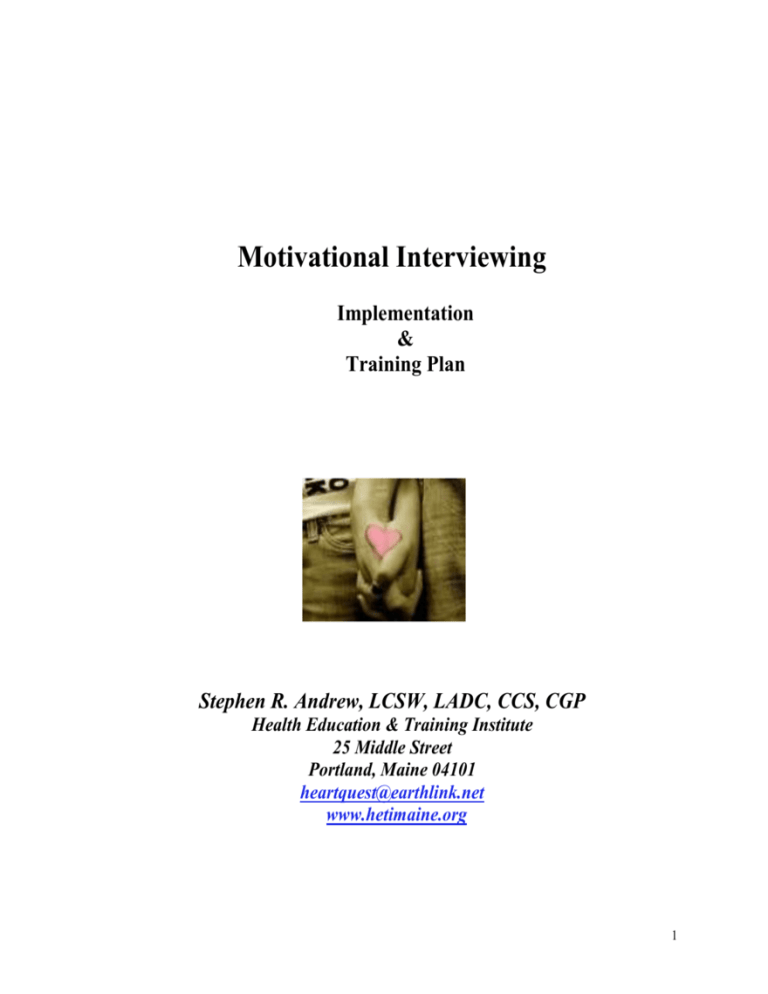
Motivational Interviewing Implementation & Training Plan Stephen R. Andrew, LCSW, LADC, CCS, CGP Health Education & Training Institute 25 Middle Street Portland, Maine 04101 heartquest@earthlink.net www.hetimaine.org 1 Note This document presents a complete implementation plan with expectations of administrative and human resource support, designed to develop global proficiency of the center’s clinical staff. The plan is modular and can be adapted to your center’s needs and budget, with similar expectations applied to proficiency outcomes. I would be happy to discuss your center’s needs and the kind of results you can expect with the training program you choose.Table of Contents Note............................................................................................................................................. 2 Introduction ................................................................................................................................ 4 Motivational Interviewing Implementation ................................................................................ 8 Integration and assuring staff buy-in ......................................................................................... 9 Training .................................................................................................................................... 12 Training coaches and your agency’s leadership ................................................................... 12 Eight Tasks in Learning Motivational Interviewing ............................................................ 13 Overview of Training Plan ................................................................................................... 13 Training specifics ..................................................................................................................... 14 Training management ........................................................................................................... 14 Motivatonal Interviewing: The Basics workshop for management.................................. 14 Training/coaching clinical staff and selecting the coaching team ........................................ 14 Introduction to Motivational Interviewing workshop (optional)...................................... 14 Motivational Interviewing: the Basics workshop for clinicians, plus facilitator-led clinical development ..................................................................................................................... 15 Coaching Motivational Interviewing Practice Workshop ................................................ 17 MI: Advancing the Practice Workshop ............................................................................ 17 MI: The Power of Groups (optional) ................................................................................ 18 2 MITI Coding for coaches (optional) ................................................................................. 19 Quality assurance for staff ....................................................................................................... 20 Clinical development sessions with designated in-house coaches ....................................... 20 Guidelines for clinical development sessions....................................................................... 21 Recommendations: ................................................................................................................... 23 3 Intrinsic motivation for change in the clients and their families arises in an accepting, empowering atmosphere of care that makes it safe for the client to explore the possibly difficult present in relation to their dreams, needs and values. People often get stuck, not because they fail to appreciate the down-side of their struggles, addiction, mental health, and criminal behavior, but because they feel at least two ways about it. The way out of the forest, the way to effect change, has to do with eliciting and strengthening what the person is experiencing and how they will change, from his or her perspective. (Miller and Rollnick, 2002) Introduction Motivational Interviewing was developed by William Miller, Ph.D. and Stephen Rollnick, Ph.D. to help people with change in their lives, especially in the area of addictions, corrections, tobacco, mental health, eating disorders and chronic health problems. The implementation and training ideas presented here are intended to help the staff change the way they have been doing the work (assessments, diagnosis & treatment) for some time. They are aimed at helping an agency effectively integrate and implement the practice-based intervention of Motivational Interviewing, in its daily practice working with its target clientele. This approach is also applicable to group interventions. Clinicians1 are well-trained to assist people in the acute and action phases of treatment. In the former, the clinician takes a necessarily active role in the care of the individual and in the latter, s/he is called upon to create a structured action plan. The clientele normally seen in our centres are, to a great extent, stuck between these two phases and respond poorly to being asked to relinquish their autonomy, which may be necessary in the short term in the acute phase, or to be encouraged or pressed to take action before they are ready (action plan). It is in this static phase that clinicians’ training often fails them. And it is in this phase where Motivational Interviewing is most effective. Asking clinicians for change results in this clientele without giving them 1 The term “clinician” refers to anyone who is involved in client intervention. 4 adequate training and support can create a sense of pressure and helplessness that can lead to feelings of incompetency and ultimately have a maladaptive effect leading to burn-out, increased absenteeism and reduced productivity, pleasure and engagement in the workplace. These results are costly to personnel, clients and to the centre. As humans we often resist change. We find comfort and a sense of confidence in the old tried-and-true, in doing things the way we’ve always done them. Resistance to change is not unique to the individual. Agencies, groups, institutions and disciplines also resist change. The same institutions instituting change often create barriers, sometimes inadvertently, because change is often seen as a threat to stability. So, at every level of the institution, from the upper administration, to the clinicians, the members of that institution must do their part to implement the global change, if it is to be a success. Incorporating new technologies requires changing the way we do things. We have borrowed thoughts from, and recommend that management and supervisors2 read, The Change Book, which was developed by United States Addictions Technology Transfer Center (ATTC) National Network to help organizations, (not-forprofits, mental health, criminal justice and alcohol and other drug treatment agencies) to implement initiatives that will improve outcomes in agencies just like yours. The Change Book includes principles, steps, strategies and activities for achieving effective change. However, as an introduction, we will focus on the principles of successful institutional change when implementing new practice-based technologies or strategies such as Motivational Interviewing. Strong participation, and active bi-directional communication in change initiatives decreases resistance and increases buy-in to the change process (adapted from “The Change Book” ATTC publications, 2000). 2 The terms “coach” and “supervisor” in this document are used interchangeably to refer to individuals trained to offer clinical development (supervision and coaching) to staff members. 5 The technology and strategy, in this case Motivational Interviewing, must be relevant and have obvious, practical application for the staff in helping them work with their clients. It has to be timely: implemented, at a moment when staff members acknowledge the need for this strategy and/or theoretical framework now and/or in the future. It also has to be clear: the language and process to transfer the intervention spirit, skills and/or strategy must be easily understood by the staff. It has to be credible: the clinician must have confidence in the underlining assumptions, techniques and evidence of the approach. It has to also be multifaceted: hence include a variety of interventions and formats suited to the various treatment theories of change process. It must be a continuous process: consequently the new practice has to be continually reinforced at all levels of the organization until it becomes the standard of practice and then is maintained as such. Finally, it has to be bi-directional: from the beginning of the change implementation, all staff members who are targeted to use the approach must be given opportunities to communicate to management and directly with training facilitators about their struggle learning and implementing its practice and sufficient training opportunities. The guidelines outlined in this document are intended to help managers, supervisors and therapeutic staff at your centre train present employees and newly hired staff in the spirit, structure and skills of Motivational Interviewing. It is also intended to guide the coaching team and managers in implementing strategies for long-term sustainability of consistent proficient use of Motivational Interviewing among the staff. Resources such as PowerPoint presentations of Motivational Interviewing training, literature, handouts, and additional training and supervisory tips will be made available 6 and the MINT website (www.motivationalinterviewing.org) is also a very good source of supplementary information. The training facilitators at Health Education & Training Institute can provide the necessary support to help implement the practice of Motivational Interviewing, including offering coding of recordings of clinicians’ client interventions. Look at the pearl. What was once a mere piece of sand within the folds of the mollusk becomes a precious gemstone. Examples abound of small actions, over time, producing sights which are truly impressive to behold … results which can truly stagger the mind. The Power of 10% by Eric Harvey and Michelle Sedas It takes a vision, focus, leadership and time to change the culture of an organization. Successful change starts at the top with leaders who provide strategic vision and establish goals and priorities. Team leaders don’t micromanage—they empower and inspire individuals to accomplish the stated objectives. Successful leaders embrace the power of teamwork by tapping into the innate strengths each person brings to the table. An effective leader “walks the talk” and sets the standard. It is they who must carry the two banners that embody the spirit of Motivational Interviewing: We will no longer be in a power struggle and we will no longer give unsolicited advice, direction or feedback. Management will model this to their staff, so that the staff will implement it with their clientele. 7 Motivational Interviewing Implementation The basic principle behind these ideas is that implementing Motivational Interviewing as a consistently used intervention requires on-going training and coaching of the staff. This plan brings in expert Motivational Interviewing facilitators from Health Education & Training Institute to train management, and staff as well as training coaches and creating coaching teams to sustain the practice from within your organisation. The expert facilitators are also responsible for objectively measuring coaches’ proficiency, by coding audio recorded interventions at regular intervals and giving feedback3. Together, the agency leadership and the coaching team (see below) perform a very important role in the maintenance of Motivational Interviewing practice, spirit and skills. To adequately assure that the approach is well-integrated in your centre, resources for training, clinical development, and coding time must be allocated. This includes liberating staff, not only for training time, but adjusting workload appropriately during the training process. Without strong leadership and management, which put emphasis on, and resources behind, this ongoing support, agencies have not been successful in implementing and maintaining practice-based intervention strategies over time. Thus, this vision recommends that management be trained in the approach, personnel be selected to become coaches by virtue of their interest and skill in the approach, and staff be trained and supported with ongoing coaching and supervision. To ensure integrity and the maintenance of this practice, hiring criteria should be in synchrony with the intent to sustain Motivational Interviewing over time. It is suggested that management, clinicians and coaches are hired and promoted on the basis of their knowledge, skills and demonstration of Motivational Interviewing, whenever 3 As assessed through use of the objective measurement tool, Motivational InterviewingTreatment Integrity (MITI) or similar. 8 possible, or that taking Motivational Interviewing training is a pre-requisite to being hired, when it is not. It is strongly recommended that the applicant (clinician or coach) be required to conduct an individual session (this could be a real-play4, or an intervention with a client). The individual session could be observed by an experienced Motivational Interviewing consultant, coach, or group of trained staff using a Motivational Interviewing coding system such as the MITI. In an effort to reduce any anxiety about the process in the long-run, the applicant should be informed that evaluation of recorded sessions is an integral part of the recruiting and skill-maintenance process, and that your agency will be requiring proficiency in this approach for all new staff and coaches. When hiring a new clinician it is important to observe whether or not the Motivational Interviewing skills are firmly in place or, at a minimum, that the clinician’s style is consistently empathic and motivational, and not confrontational and rigid. The latter characteristics are inconsistent with Motivational Interviewing and can create training and coaching challenges. This hiring procedure will bring the best results in terms of sustaining Motivational Interviewing philosophy and practice over time. Many dollars can be spent on training, with very little effect, if newly hired clinicians demonstrate low empathic skills, unsolicited advice-giving, rigidity and a confrontational therapeutic style. Integration and assuring staff buy-in Coaches should have a key role in both the coaching of new and present clinicians, as well as maintenance of Motivational Interviewing throughout the agency; thus, hiring practices for coaches should be even more rigorous about proficiency of Motivational Interviewing than for staff. The integration with management of the coaches in planning, 4 Real-play refers to a situation in which one person (who acts as the “client”) uses a situation from his/her life with a clinician (who acts as the “clinician”). This avoids the traps of role-plays where at some point acting is required as is guessing what might be the real motivation for a fictitious person. 9 creating and maintaining structures for ongoing support of this approach is critical to the success of the maintenance of Motivational Interviewing in your centre. Management expectation should be that each clinician gains proficiency in Motivational Interviewing as an evidence- and practice-based, “basic” communication foundation over a period of two years, and should be clearly expressed to the staff. It is recommended that the practice of skills with the goal of proficiency using Motivational Interviewing be included in the annual clinician evaluation process, and that clinical staff be strongly encouraged to participate in the on-going coaching groups. To that end, it is important to keep an ongoing bi-directional communication with administrative personnel, the coaching team and staff to evaluate the efficacy of Motivational Interviewing implementation, the pros and cons of the use of Motivational Interviewing, and to assess clinicians’ buy-in and attitudes about Motivational Interviewing. When staff are told to use a strategy because it is empirically validated and it is expected, they may tend to resist and create barriers to the impose change. On the other hand, if Motivational Interviewing and the training appear to be a helpful tool for work with their cases, the attitudes towards learning are more positive. It is always the best policy to involve the staff in conversations, truly inviting their opinions about this new practice. At the minimum, the management and coaching team can assess the staff attitude, and take steps towards improving it if necessary. No amount of workshops, consultation and coaching can overcome resistance and lack of buy-in if the management is not prepared to address it first. Motivational Interviewing coaching strategies are useful to augment buy-in. The strategies are: open-ended questions (“What are some of your thoughts about Motivational Interviewing?”), offering affirmations (“You folks can certainly learn and 10 get better at reflections; you have demonstrated a lot of dedication learning Motivational Interviewing.”), reflections (“So Motivational Interviewing seems a little too soft on the client for you; tell me more about how you see this happening.”), and even summaries demonstrating clinician ambivalence (“On one hand, the clinicians want to be on the cutting edge of what works, and5 at the same time the staff is used to working in a specific way that seems effective, and feels a bit overwhelmed by the management’s desire to implement evidence-based care.”). Ambivalent thoughts are an integral part of being human, as well as part of the change process. Change occurs when one side of the ambivalence finally outweighs the other; the other side, however, does not disappear. Addressing that ambivalence will go a long way to increase staff interest in the implementation process. Rolling with resistance goes a long way when dealing with clinician resistance and towards change. If the supervisor/coach engages in a power struggle, the clinician member “loses” although in reality is an all-lose proposition. Arguing for change has to come from management and the clinicians. This is achieved through bi-directional communication efforts. The practice of a parallel process—training management, supervisors and staff—is a clear way to teach/coach and send the message through role modeling of the importance of using Motivational Interviewing. 5 Using “but” when pointing out ambivalence gives the impression that it is one thought or the other, with an emphasis on the thought following the “but”. In the Motivational Interviewing philosophy we favor using “and” as a way to show the dialectical play between opposing thoughts. 11 Training Training coaches and your agency’s leadership Supervisors (whether hierarchical or clinical) are ideally placed to be the keepers and perpetuators of Motivational Interviewing and should therefore be either already MItrained or included early in the implementation process in Motivational Interviewing, i.e. in first round of training, either with management or clinical staff, as appropriate + coaching sessions (see below). Coaches’ proficiency is the key to Motivational Interviewing quality assurance over time so that they can encourage, support and guide the clinicians in their process of learning Motivational Interviewing. They should be chosen by virtue of their hierarchical position and/or their enthusiasm and interest and/or skill-level in Motivational Interviewing and/or clinical coaching. Health Education & Training Institute can provide additional training and/or coaching until their skills reach proficiency levels. Together, the management and coaching staff, through modelling Motivational Interviewing spirit and principles, can smooth the way of implementing Motivational Interviewing in your centre. This is the area in which the Motivational Interviewing model will succeed or fail for the agency. Coaches, and administrators interested in improving their own Motivational Interviewing practice with their employees, are expected to submit at least one recording of an intervention, either with a client or in a coaching context with another staff member, per month for coding of their Motivational Interviewing intervention. This ensures an ongoing maintenance of Motivational Interviewing practice at all levels in your centre. 12 The objectives of the training follow the steps outlined in the “Eight stages in learning Motivational Interviewing.” (Miller, W. R., & Moyers, T. B. (2006). Journal of Teaching in the Addictions) Eight Tasks in Learning Motivational Interviewing 1. Getting the spirit of Motivational Interviewing 2. Using client-centered skills (OARS) 3. Recognizing change talk 4. Eliciting and reinforcing change talk 5. Rolling with resistance 6. Developing a change plan 7. Consolidating client commitment 8. Integrating Motivational Interviewing with other intervention methods Overview of Training Plan 1. Two-day management workshop (The Basics, emphasis on how to implement support structure to maintain Motivational Interviewing in your centre) 2. ½-day introductory workshop for staff (optional) 3. Two-day basic workshop for designated coaches (1 per 10 clinicians) and clinical staff 4. Two-day coaching workshop for designated coaches 5. 14 hours of facilitator-led clinical development sessions for coaches and clinical staff (coaches receive coaching on coaching & Motivational Interviewing skills; staff receives feedback on Motivational Interviewing skills and practice) 6. Advancing the Practice workshop for coaches and clinical staff (6 months after end of facilitator-led clinical coaching sessions) 7. Auxiliary services: tape coding and feedback for coaches and interested administrators; DVDs and other coaching material, periodic consultations with Health Education & Training Institute additional trainings such as the Power of Groups, MITI coding, etc. 13 Training specifics Training management Motivatonal Interviewing: The Basics workshop for management All management staff will be offered a two–day Motivational Interviewing practice and didactic training in the basic principles and skills of Motivational Interviewing. The goal of this workshop is to expose the management staff to Motivational Interviewing’s complexity through experiential and didactic learning methods in order to facilitate the following among the clinical staff that are, or will be, trained in Motivational Interviewing: 1. 2. 3. 4. 5. 6. 7. 8. 9. The identification of the current state of readiness of change in the clinician Building rapport and creating authentic, respectful engagement Using goal-oriented, empathetic communication Negotiating goal setting Providing advice and information collaboratively Enhance the clinicians ability to understand and demonstrate practice of MI Increasing the clinicians’ ability to increase intrinsic motivation Augmenting the person’s understanding of the core underlying assumptions of therapy Adding to the person’s understanding of effective Motivational Interviewing: its spirit, structure and skills 10. Understanding change goals and their natural time-line and process Training/coaching clinical staff and selecting the coaching team Introduction to Motivational Interviewing workshop (optional) All clinical staff will be offered a one-half day introduction to Motivational Interviewing practice and the basic principles and skills of Motivational Interviewing. The goals of this workshop are: 14 1. Exposing the entire clinical staff to this newly adopted therapeutic approach so that everyone becomes at least familiar with the approach, its principles and its spirit, and 2. Determining which staff members are interested enough to participate in the training and coaching/supervision sessions Motivational Interviewing: the Basics workshop for clinicians, plus facilitator-led clinical development The introduction is followed shortly thereafter by a two-day Motivational Interviewing workshop plus 7 facilitator-led two-hour coaching sessions every two weeks for 14 weeks. This workshop presents the basic principles and skills using experiential and didactic facilitation methods in order to realise the same goals as above: 1. 2. 3. 4. 5. 6. The identification of the current state of readiness of change in the client. Building rapport and create authentic, respectful engagement. Using goal-oriented, empathetic communication. Negotiating goal setting. Providing advice and information collaboratively. Enhance the clinicians’ ability to understand and demonstrate practice of Motivational Interviewing. 7. Increasing the clinicians’ ability to increase intrinsic motivation. 8. Augmenting the person’s understanding of the core underlying assumptions of therapy. 9. Adding to the person’s understanding of effective Motivational Interviewing: its spirit, structure and skills. The clinical development sessions help to crystallize the training and put the acquired skills into practice with real-time feedback. These sessions are done in small (between 58 people) groups that share and discuss recorded client (with due informed consent), or real-play with non-clients, interventions with each other and the coach. The recordings are coded for Motivational Interviewing-adherent behaviours and possible alternative responses are generated by the group. It is recommended that each clinician be 15 encouraged to record 3 to 6 sessions and have them coded for the proficiency level of the work during this phase of training6. Facilitation of these initial coaching sessions is offered by Health Education & Training Institute. During the six months between the end of the Basic workshop and the Advanced, clinicians should be encouraged to submit one recording per month to a coach for specific feedback on their Motivational Interviewing practice. This is also the place where the designated coaches begin, and then continue, their coaching training, since they will take over the coaching duties from the hired facilitators. These meetings can also be used to present other MI-informed material, such as videos, targeted exercises to address skills with which clinicians are having difficulty, etc. Even with the time constraints usually encountered in our field, we find that coaches and clinicians receive great value in a one- to two-hour guided discussion/recording review every other week. This post-workshop exposure enhances the retention of information received during the workshop and reduces resistance towards the material and subsequent supervisions. We recommend the material to help organize the study groups that is available on the Motivational Interviewing official site: www.motivationalinterviewing.org. Some of these sessions can be done via teleconferencing, although in order to build a safe and warm environment in which 6 The research has shown that integration of Motivational Interviewing into a clinician’s practice occurs in a time frame of 3 to 6 coaching sessions of a clinician’s intervention with clients through recordings and/or direct observation. 16 clinicians will be comfortable to share their practice, at least a certain number of the initial sessions will be held with the facilitator at your centre. Coaching Motivational Interviewing Practice Workshop Designated coaches are then offered a one-day training in Motivational Interviewing coaching skills in the period between the end of the theoretical training (the two-day Basic workshop) and the beginning of the clinical development sessions. This is to provide them with the theoretical basis for the coaching skills they will be using in coaching sessions with the hired facilitator, and when they take over the lead after the hired facilitator leaves the centre. Goals of this workshop are: 1. To teach the basics of MITI coding (sufficient for leading coaching sessions, but not necessarily sufficient for proficiency evaluation coding) 2. To teach coaches how to provide accurate feedback in a supportive way, using the clinician’s strengths and Motivational Interviewing-adherent behaviour. 3. To teach the coaches how to guide clinicians in the work of evaluating their own practice and create a safe place to discuss Motivational Interviewing practice issues. MI: Advancing the Practice Workshop Coaches and clinicians are also offered a one-day Advanced Practice Motivational Interviewing Workshop, six months after the end of the 14-week, facilitator-led coaching sessions. The advanced workshop includes experiential exercises, video clips, trainer demonstrations and real- and role-play in order to optimize practice and feedback. The content of this workshop comes from the knowledge that there are particular skills that 17 are more difficult to master, and that the mastery of these skills is necessary to increase practitioners’ proficiency. The goals of this workshop are the following: 1. A deepening of the participants’ understanding and practice of Motivational Interviewing spirit and basic strategies and skills: open-ended questions, affirmations, empathic reflection-both simple and complex, and effective summaries 2. Identifying, eliciting and strengthening change talk (desire, ability, reason, need, commitment and taking steps) 3. An increase in the participants’ ability to recognize and respond to discordance such that it is reduced. 4. Identifying and responding to sustain talk. 5. A discussion of the ethical concerns of using Motivational Interviewing. (When do you use Motivational Interviewing? When don’t you?) 6. Presentation of ways to increase importance and confidence (the dimensions of motivation). 7. Responding to any specific questions about Motivational Interviewing practice from coaches or staff 8. Specific skills to be taught in this workshop: Emphasizing choice, Empathy, Asking permission to make a transition or give advice or information, Giving feedback discreetly, reflecting discordance and sustain talk, being alert to the client’s readiness to change, strengthening inner commitment to change and raising awareness of, and responsiveness to, self-motivating statements and behaviours MI: The Power of Groups (optional) Motivational Interviewing can be best described as a style of communication and practice that is empathetic, person-centered, and respectful of client’s readiness and that builds on the person’s strengths. Moreover, it is a compassionate philosophical stance, where the clinicians truly believe that the client has his/her own resources and answers. Using Motivational Interviewing draws the solutions from the person; the clinician and client enter into a clinical dance in which they can help each other. Even advice, which is the most commonly used as a care/ “counseling” tool in most forms of case management, is offered with permission and without the assumption that the staff really know what is best for the person. Empathic reflection is favoured as the clinician’s main active skill; 18 open-ended questions can also open discussions and group interactions; affirmations are always welcomed, and summaries can help the clinician regain the focus of the group process and facilitate the conversation in the desired direction. These features translate well into the therapeutic group setting. Motivational Interviewing can even be used as a preparatory step for Cognitive-behavioural therapy work. This two-day workshop is designed to aid clinicians who are already trained in Motivational Interviewing to use it in a group setting. The goals of this workshop are: 1. 2. 3. 4. 5. Learning to balance the individual, inter-individual needs and group needs Using opening and closing rituals to build a group identity Setting guidelines Using dynamic activities Learning how to deal with individuals who pose a challenge in the group (aggressive, non-participatory, retiring, destructive to the group, in crisis, etc.) 6. Building cohesion 7. Working with a co-facilitator …all while using the Motivational Interviewing spirit, principles and skills MITI Coding for coaches (optional) This two-day workshop uses coded interventions (recordings and verbatim) to teach coaches how to use the MITI in order to objectively guide clinicians to improve their practice and to evaluate proficiency according to levels established with this tool. The goals of this workshop are: 1. Learning the nuances of MITI coding 2. Learning the proficiency levels of both the Motivational Interviewing behaviour and the global scores 3. Learn to reliably evaluate recordings to determine levels of proficiency and areas that need work to achieve proficiency. 19 Quality assurance for staff Clinical development sessions with designated in-house coaches Submitting a recording and/or direct observation of a session to be coached/ reviewed by a coach might be stressful and cause anxiety for the clinician. Staff should be assured that this process is safe and respectful and is a way to create learning opportunities for both the coach and the clinician. Practice and/or review of recordings in supervision or with coaching is a delicate dance, where the in-house coach models Motivational Interviewing by asking the clinician to come up with his/her own ideas on how to improve his/her Motivational Interviewing practice. The objective is to enhance the clinician’s skills, not to create staff resistance, hence the need to use the same principles that apply to Motivational Interviewing in client care: asking open-ended questions, affirming clinicians’ strengths, reflecting and making summaries of ambivalence about learning and using Motivational Interviewing, etc.. This is vital to the integration of Motivational Interviewing in the agency. Coaches communicate much of their Motivational Interviewing know-how through modeling, in the same way that clinicians model target behaviours in their work. Therefore, we suggest that coaches develop a style consistent with Motivational Interviewing principles that is clinician-centered, motivational, staff self-efficacy enhancing, goal-oriented, non-confrontational (while still holding the clinician accountable for his/her actions), and that elicits changes from the clinician without being prescriptive or taking on the “expert” or the “professional” role. We propose that coaches be expected and instructed to utilize Motivational Interviewing as their primary style of communication and use modeling of the approach to help the clinician reach and maintain 20 Motivational Interviewing proficiency. The purpose of Motivational Interviewing coaching sessions is to enhance Motivational Interviewing practice and efforts should be made to maintain the focus on this approach alone during these sessions and not on the clinician’ therapeutic choices. Practicing with clients and/or role-playing, choosing fictional cases that represent the work of your centre, can facilitate these learning goals. Guidelines for clinical development sessions It is always better to elicit the clinician’s opinion before giving the coach gives his/her own. Some of the questions the supervisor or coach might ask are: How have things been going in using MI? What would you like to work on during this coaching/supervision session? Other possible supervision focus points are; Transforming questions into reflections Using the Elicit, Provide, Elicit model Using complex reflections rather than simple reflections Using the Importance and Confidence rulers Using the Decisional Balance Recognizing change talk Eliciting and strengthening change talk Exploring clients’ values Problem-solving difficulties encountered using MI Assessing the value of Motivational Interviewing in our work Developing the clinicians’ awareness of the client with questions like: Where is the client in terms of readiness to change? What will motivate this client to make changes in his/her life? What is the client’s theory of change? What does s/he really want to change? Health Education & Training Institute will ask coaches, supervisors and management about how effective the Motivational Interviewing training is for their clinicians and for feedback and ideas for further training. 21 When a clinician is having difficulty applying Motivational Interviewing in a particular case, it is helpful to discuss the case and immediately role-play it. In the initial phases of building the relationship between the coach and the clinicians, it is best for the supervisor to play the “clinician” during role-play and have the clinician play the 'difficult' client. Again, modeling will be a key to teaching/coaching the Motivational Interviewing practice. As the coaching relationship becomes more comfortable, the client can be played by either the coach or the clinician. Thus, during the role-play with the clinician as him/herself, the coach can see how s/he is using the following skills: 1. the micro-skills – use of open-ended questions, affirmations, simple & complex reflections and summaries. 2. eliciting and strengthening change talk 3. responding to change-talk to create commitment language 4. using strategies to respond to discordance and sustain talk (especially simple and complex reflections) 5. using the Importance and Confidence Rulers 6. Amplifying ambivalence 7. giving advice and information while staying with the spirit of MI During role-play or when they are listening to a recording the coach or the clinician can “stop the scene” and make comments, discuss next intervention options or fast forward and rewind. The coach will be modeling, and showing that there is never just one right intervention to respond to a client’s statement, but a menu of options that gradually will be mastered by the clinician. This is another place where modeling the behaviour is superior to just discussing the case. Merely discussing cases has not been shown to yield good results in improving clinical practice. 22 Recommendations: 1. Motivational Interviewing integration must be top-down with everyone adopting and modelling the spirit, particularly regarding supervision of staff members and clinical practice. 2. Management must strongly encourage and fully support on-going clinical development for staff by training in-house coaches, setting up a regular schedule of Motivational Interviewing clinical development sessions and by liberating clinicians’ time and adjusting their workload so that they can take advantage of practice-improvement opportunities. 3. Hiring and promotion policies should have an Motivational Interviewing proficiency focus: expectations that clinicians be, and stay, proficient in Motivational Interviewing through on-going review of recordings of clinical interventions and attendance at coaching sessions should be clearly stated and rewarded. 4. Coaching staff should be regularly evaluated by externally-provided MITI coding of recordings to ensure proficiency. If standards drop, “booster” training sessions should be offered to return to proficiency levels. Some of these coaches should be trained in the MITI to promote in-house evaluation services. 5. A step-wise integrated training and clinical development plan adapted to the various concerned parties (management, coaches, and clinicians) should be followed to provide adequate learning opportunities to achieve and maintain Motivational Interviewing proficiency. Staff members should be encouraged to bring recordings of clinical interventions to coaching sessions regularly—a goal of one recording per month is optimal. Administrators and coaches are also expected to provide one recording per month for coding by MITI-trained practitioners.7 7 For the first year. Thereafter, submissions should be coded to maintain competency levels; should those levels drop, the frequency of submissions should increase or a booster session should be requested. 23
